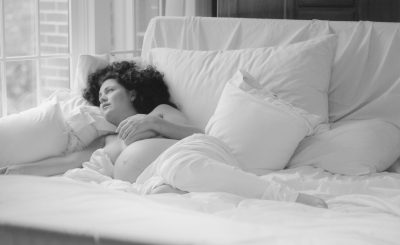
OUR STORY
Discovery
Samuel’s delivery was flawless. Everything went according to plan and as i held him tight to my chest, nursing him only minutes after he was born, it was the highest high and the most in love I had ever felt.
As doctors and medical students began to surround me, I thought they were all there to congratulate me and share in my joy but they knew something I didn’t.
The doctor said, “We think your son might have Down Syndrome.” My arms went weak and for the rest of the conversation, it was as if i was witnessing it all from above.
For the rest of the evening, I was so emotionally overwhelmed I couldn’t comprehend any of the information provided by the priests, rabbis, adoption agencies, social workers, and marriage counselors who crowded my room. I felt like I was running in quicksand.
Nurses came in and out of the room to check on Samuel and me that night. As one nurse checked my pulse, she began to cry. I thought it was more ominous news about Samuel, who was fast asleep in my arms.
But instead, she said, “He’s so lucky. Most of ‘these’ kids go to the nursery and a lot of them don’t ever go home with their family.”
taking action
From that moment on, I dove in headfirst and learned everything I possibly could about Down Syndrome. I thought I knew about Down Syndrome, but when it came to caring for my child, I really didn’t know. I discovered that Down Syndrome did not have to limit what Samuel could achieve in life.
I immediately exposed Samuel to everything I knew could be beneficial for him. I looked for toys, activities, and exercises designed to help him gain strength. once he could eat solid foods, we only gave him organic food and foods high in healthy fats to feed his brain, like avocados, coconut oil and salmon.
We rejected stereotypes that painted children with Down Syndrome as incapable. We fought with the school system to make sure he received the attention he needed, and we went through a series of doctors in order to find one that would not sell him or his developmental growth short.
Because of our interventions, today Samuel is a healthy 19-year old whose wellness is not limited by his diagnosis. He has broken through many of the barriers people have placed in front of him because he has Down Syndrome: he is energetic, has a high level of concentrations, maintains a healthy body weight, and even takes part in ensuring his own wellness by making healthy decisions with us. If we had simply been content that he was lucky enough to come home with us, Samuel could have never achieved these things.
new directions
For everything that we did and all the love and support we gave Samuel, there is still much more we could have done and can do in the future.
Four years ago, I attended a conference where I learned about the connection between Down Syndrome and Alzheimer’s. I was blown away and heartbroken once again.
Studies have found that more than 75 percent of people with Down Syndrome aged 65 or older have Alzheimer’s disease, a rate six times higher than those without Down Syndrome. Almost all individuals with Down Syndrome have developed abnormal protein deposits in the brain by age 40, which are considered Alzheimer’s traits.
If i had known about this connection early on, I would have taken more steps to prevent or delay Alzheimer’s. Researchers all agree that a healthy diet and exercise can lower the risk of developing Alzheimer’s, but this advice is not routinely provided to parents of children with Down Syndrome.
making a difference
Almost every single one of my friends who has had a child with Down Syndrome has been given the same, simple piece of advice I was given in that hospital room: “Take him home and love him.”
This is perhaps the single best and worst piece of advice. It is not enough to simply love children with Down Syndrome - that is the easy part.
We must have higher expectations for our children. We must fight for better education, better care, and better health. And we must join together to achieve these goals.
For these reasons, I have established the Samuel Floersheimer Foundation. We seek to foster a strong and supportive network where parents can share information, share research, and share experiences, that will help improve our children’s lives. We financially support further research into Down Syndrome and its link to Alzheimer’s, and we partner with like-minded organizations and institutions to increase the impact of our activities.
Every child with Down Syndrome deserves the same opportunities Samuel had. We hope you will join us in ensuring this dream becomes a reality.